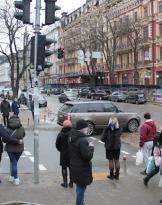In my experience following the KFOR soldiers I was lucky enough to test the work of the military chaplains following the contingents in the operational theater.
But let's make a very small hint of what themilitary ordinariate, and who are the military chaplains in Italy. The Republican constitution in art. 7 regulates relations between the State and the Holy See. The first agreement between the Italian State and the Holy See was the Lateran Concordat of 11 February 1929, later with the advent of the Republic this agreement was revised with law no. 25.
Pursuant to paragraph 2 of article 11 of the aforementioned Agreement, spiritual assistance to the personnel of the Armed Forces is ensured by ecclesiastics appointed by the competent Italian authorities. At the same time, the Code of the military order in article 1533 provides that the senior management of the spiritual assistance service is delegated to the Military Ordinary for Italy, assisted by the Military Vicar General, respectively assimilated to the rank of general of the corps of army, of major general. The latest legislative act that has revised (downwards, in my opinion) some points of the previous agreement is the law of 22 April 2021, n. 70.
Currently themilitary ordinariate it is directed by the Rev.ma Msgr. Santo Marcianò, ordinary military archbishop for Italy.
Going beyond the cold legislative aspect, what is the role of a priest with stars?

Surely it is easy to understand that a military chaplain takes care of all the spiritual assistance of the soldiers of the department to which he is assigned. But there is much more, and this more I had the opportunity to see personally during my stay in Kosovo, which gave me the opportunity and the pleasure of meeting Don Fausto Amantea, the military chaplain of "Villaggio Italia" headquarters of the Regional Command - West by KFOR.
Don Fausto is a long-time priest who, before wearing the camouflage, had great experiences in his priesthood, also spending a long period as a missionary in the Amazon.
At a certain point in his life the opportunity arises to testify to his ministry among the military, that is, among those people who are not exactly the classic example of a sacristy baciapile. Don Fausto accepts the challenge with an enthusiasm worthy of the most daring soldier which leads him, in a short time, to accumulate repeated missions abroad including Afghanistan and Kosovo.
The first meeting takes place almost by chance, during the journey on a military vehicle to go to the inauguration, chaired by the general commander of KFOR, of an orphanage run by Italian volunteers.

During the journey we chat as if we had known each other for years, and among other things he confides to me that he feels the responsibility of being the priest of the military on a mission inside, so much so that he never takes the leave period foreseen for the military abroad. , which would allow him to return to Italy for a few days and hug his loved ones again. This choice of his, he tells me, is due to the fact that if a soldier needed a word of comfort or understanding and did not find it in those days of leave, he would never forgive himself.
I have a further sign of attachment to the uniform and to his own ministry when he confides in me that he will donate practically all of his mission allowance to the needy local people, going to support humanitarian initiatives around Kosovo.
A chaplain on a mission, even more than at home, is not just a minister of worship, but is a point of reference, also and above all for a non-believer, a cross between a confidant, a psychologist and a disinterested friend who is always ready to listen to you. . The strength of all this lies in the fact that, in order to speak with the chaplain, there is no need for any hierarchy to follow and no formalities. Even if the chaplain has the ranks of an officer.
At the moment of my departure, greeting us at the base bar, I ask him one last thing: "Don Fausto if you had to define your military priestly office with a sentence how would you define it?"
Don Fausto looks at me and without hesitation, as if expecting my question, replies: "Humble and daily presence, faithful and industrious service in and for the institutions, happy and direct living witness of Christ in the midst of the military, deep and attentive listening to the yearnings of the heart with the brothers with the stars."












